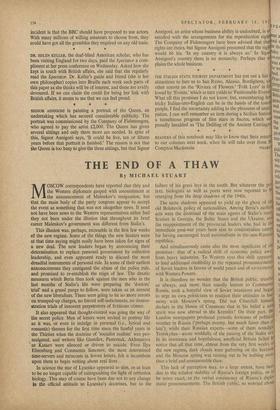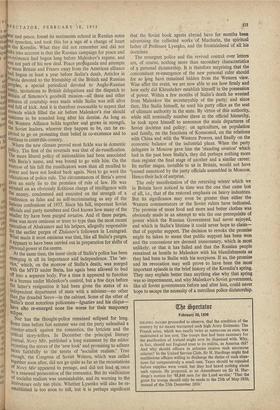THE END OF A THAW
By MICHAEL STUART MOSCOW correspondents have reported that they and the Western diplomats gasped with astonishment at the announcement of Malenkov's resignation, but that the main body of the party congress appear to accept the event as something that was not altogether news. It need not have been news to the Western representatives either had they not been under the illusion that throughout its brief 'career Malenkov's government was different from Stalin's.
This illusion was, perhaps, excusable in the first few weeks of the new regime. Some of the things the new leaders were at that time saying might easily have been taken for signs of a new deal. The new leaders began by announcing their determination to replace personal government by collective leadership, and even appeared ready to discard the most dreadful instruments of personal rule. In some of their earliest announcements they castigated the abuse of the police rule, and promised to re-establish the reign of law. The drastic measures which Beria then took against the men who in the last months of Stalin's life were preparing the `doctors' trial' and a grand purge to follow, were taken as an earnest of the new liberalism. There were going to be no more arrests on trumped-up charges, no forced self-indictments, no demon- stration trials of innocent perpetrators of fictitious crimes.
It also appeared that thought-control was going the way of the secret police. Men of letters were invited to portray life as it was, or even to indulge in personal (i.e., lyrical and romantic) themes for the first time since the fateful years in the Thirties when the doctrine of `socialist realism' was pro- mulgated, and writers like Gumilev, Pasternak, Akhmatova or Kataev were silenced or driven to suicide. Even Ilya Ehrenburg and Constantin Simonov, the most determined time-servers and turncoats in Soviet letters, felt it incumbent upon them to begin writing about real lives. gaN failure of his grass leys in the south. But whatever the pr text, biologists as well as poets were now reported to emerging from the deep shadows of the 1940s.
The same shadows appeared to yield up the ghost of 11$ old Bolshevik policy of nationalities. Among Beria's earlie acts were the dismissal of the main agents of Stalin's russi fication in Georgia, the Baltic States and the Ukraine. al the reappointment of the provincial leaders who had in the immediate post-war years been sent to concentration cam for having encouraged local nationalisms in the non-Russiao republics.
And simultaneously came also the most significant of the promises: that of a radical shift of economic policy awe! from heavy industries. To Western eyes this shift appeared to lend additional credibility to the repeated pronouncements of Soviet leaders in favour of world peace and of co-:existence with Western Powers. 0 s nt igh the' igh ign
I C St a f
ho un iti. iv
geS.
tlrn Si
Ire
the I icst ISSI and the lip. ;iai the red
Itce
list ar
dl
L'4 lit or !is r11. to
ar and peace, found its sentiments echoed in Russian notes lid speeches, and took this for a sign of a change of heart In the Kremlin. What they did not remember and did not ake into account is that the Russian campaign for peace and co-existence had begun long before Malenkov's regime, and was not part of his new deal. Peace propaganda and attempts to wean Britain and France away from the American alliance had begun at least a year before Stalin's death. Articles in Pravda devoted to the friendship of the British and Russian Peoples, a special periodical devoted to Anglo-Russian autitY, invitations to British delegations and the dispatch to Britain of Simonov's goodwill mission—all these and other gestures of courtship were made while Stalin was still alive and full of kick. And it is therefore reasonable to expect that avowals which filled the air before Malenkov's rise should continue to be sounded long after his demise. As long as, the Western Alliance holds together and grows in strength, the Soviet leaders, whoever they happen to be, can be ex- pected to go on protesting their belief in co-existence and to continue to court this country. Where the new climate proved most fickle was in domestic Policy. The first of the reversals was that of de-russification. The more liberal policy of nationalities had been associated with Beria's name, and was bound to go with him. On the morrow of his fall the russificators were then all recalled to Power and have not looked back again. Next to go were the relaxations of police rule. The circumstances of Beria's arrest gave an early lie to the promises of rule of law. He was arrested on an obviously fictitious charge of intelligence with the enemy, condemned and executed on the strength of a confession as false and as self-incriminating as any of the famous confessions of 1937. Since his fall, important Soviet officials and party members and God knows how many of the smaller fry have been purged seriatim. And of these purges, none was more ominous or truer to type than the most recent execution of Abakumov and his helpers, allegedly responsible for the earlier purges of Zhdanov's followers in Leningrad. What made it most ominous was that, like all Stalin's purges, It appears to have been carried out in preparation for shifts of Personal power at the centre.
At the same time, the inner circle of Stalin's police has been emerging in all its importance and independence. The 'ser- vice.' which, on the morrow of Stalin's death, was merged With the MVD under Beria, has again been allowed to bud off into a separate body. For a time it appeared to function as a bureau under Malenkov's control, but a few days before the latter's resignation it had been given the status of an independent department of state with a minister—no other than Pie dreaded Serov—in the cabinet. Some of the other of Stalin's most notorious policemen—Ignatiev and his clique— have also re-emerged none the worse for their temporary eclipse.
Nor has the thought-police remained eclipsed for long. Some time before last summer was out the party unleashed a counter-attack against the romantics, the lyricists and the critical story-tellers. In December the principal literary Journal. Novy Mir, published a long statement by the editor recanting the errors of the 'new look' and promising to adhere more faithfully to the tenets of 'socialist realism.' True enough, the Congress of Soviet Writers, which was called together soon after, did not go quite as far as the recantations of Novy Mir appeared to presage, and did not lead at once to a renewed persecution of the romantics. But its vindication Of socialist realism was unmistakable, and its warning to the laterateurs only too plain. Whether Lysenko will also be re- established is too soon to tell, but it is perhaps significant that the Soviet book agents abroad have for months been advertising the collected works of Muchurin, the spiritual father of Professor Lysenko, and the fountainhead of all his doctrines.
The resurgent police and the revived control over letters are, of course, nothing more than secondary characteristics of a personal dictatorship. It is therefore surprising that the concomitant re-emergence of the new personal ruler should for so 1png have remained hidden from the Western view. Wise after the event, we are now able to see how firmly and how early did Khrushchev establish himself in the possession of power. Within a few months of Stalin's death he wrested from Malenkov the secretaryship of the party; and since then, like Stalin himself, he used his party office as the seat of ultimate authority in the state. By virtue of this authority, while still nominally number three in the official hierarchy, he took upon himself to announce the main departures of Soviet doctrine and policy: on agriculture, on population and family, on the functions of Komsomol, on the relations with China and with the Western Powers, and finally on the economic balance of the industrial plans. When the party delegates in Moscow gave him the 'standing ovation' which had in the past been Stalin's, they did perhaps nothing more than register the final stage of another and a similar career.
Its earlier stages, invisible to us in Britain, would not have 'passed unnoticed by the party officials assembled in Moscow. Hence their lack of surprise.
The only manifestation of the returning winter which we in Britain have noticed in time was the one that came last of all, i.e., that of the restored emphasis on heavy industries.
But its significance may even be greater than either the Western commentators or the Soviet rulers have indicated.
The promise of more food and more and better clothes was obviously made in an attempt to win the one prerequisite of power which the Russian Government had never enjoyed, and which in Stalin's lifetime it could never hope to claim— that of popular support. The decision to revoke the promise might be taken to mean that public support has been won and the concessions are deemed unnecessary, which is most unlikely; or that it has failed and that the Russian people remained as hostile to Malenkov with his blandishments as they had been to Stalin with his scorpions. If so, the promise and its revocation may well prove to have been the most important episode in the brief history of the Kremlin's spring. They may explain better than anything else why that spring was so impermanent, and why Malenkov's Soviet government, like all Soviet governments before and after him, could never hope to escape the necessity of a merciless police dictatorship.











































 Previous page
Previous page